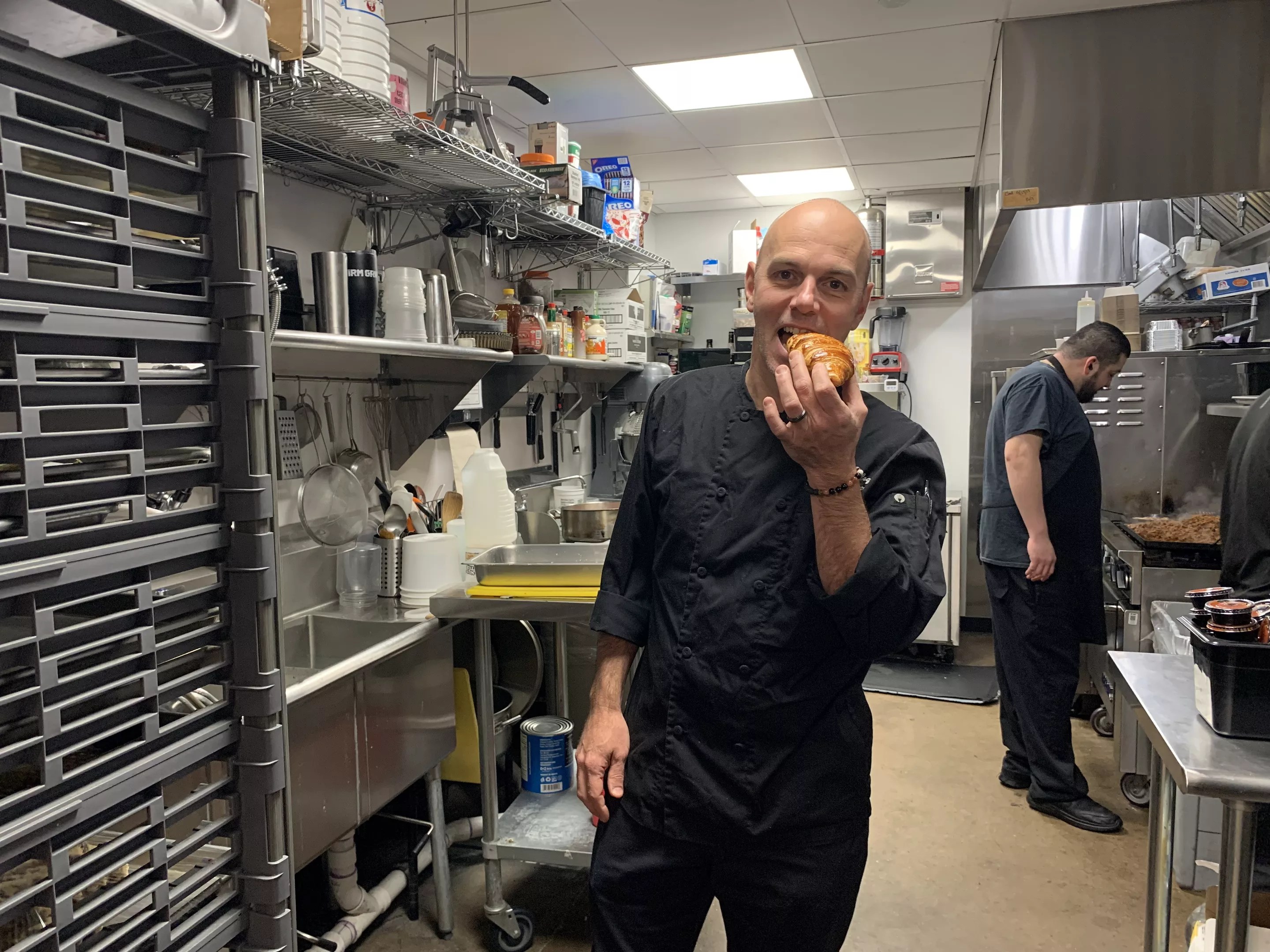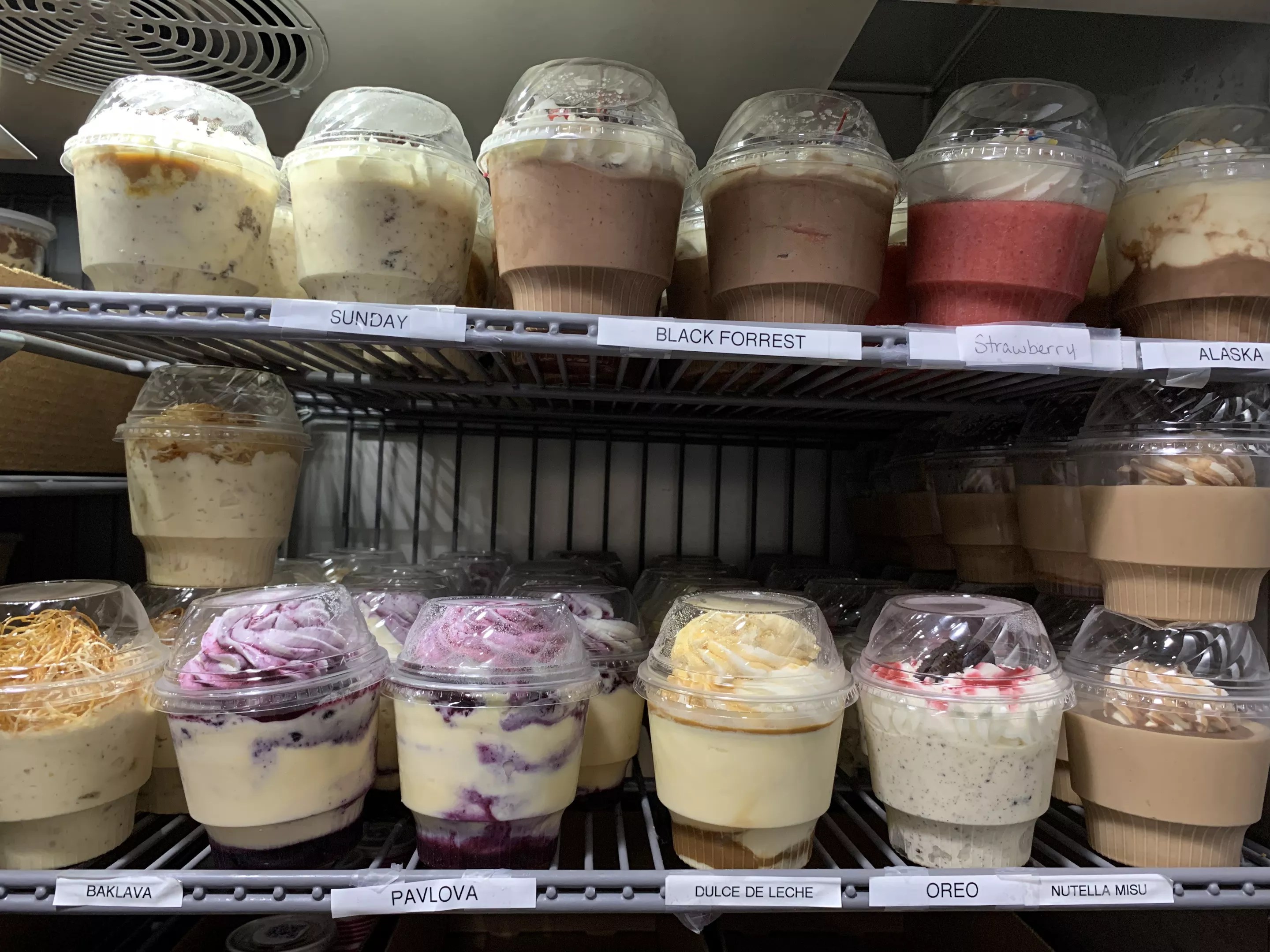
Benoit Catering

Audio By Carbonatix
Even with three successful concepts – Cafe & Bakery Cheri, Kosmik Desserts and Dr. Burrito & Mr. Croissant – French chef Benoit Coquand says the delivery-app platforms that popularized ghost kitchens barely allow him to make a living, so he’s making a bet on himself with the eponymous Benoit’s Catering.
Coquand grew up in Grenoble, France, a town at the foot of the southeastern French Alps whose landscape and climate are similar to Denver’s, along with its easy access to skiing.
Growing up, cooking was a family affair: Coquand’s parents owned a bar, his uncle was a butcher, his aunt had a restaurant, and his cousins owned a restaurant in Corsica where he often worked during his summer vacations. At age seventeen, he enrolled in culinary school, then worked at resorts located in French-speaking areas across the world after graduating, including the Le Saint Alexis Hotel in Réunion Island, Rosewood Le Guanahani in St. Bart’s, and Le Méridien Hotel in Bora Bora, with frequent rotations back to France.
In 2014, he received a prestigious offer: the position of culinary chef instructor at Culinary Institute LeNôtre in Houston. It was his first job in the United States, and he worked under the LeNôtre family, regarded as one of the greatest culinary families of France.
His stint at LeNôtre allowed him to learn under one of the best French pastry chefs, and to improve his English. But while he was grateful for the opportunity, he had a nagging desire to open a business of his own. “Being here in the United States, I wanted to do something, I wanted to try something,” Coquand explains. “I have this entrepreneurship mindset. … Having my own business, it’s important for me.”

Chef Benoit Coquand snacks on a croissant in the commercial kitchen space he rents at CloudKitchen.
Helen Xu
So when his wife, whom he met in Colombia, got a job offer with Univision in Denver, Coquand saw it as a perfect opportunity to make his dream a reality. The couple arrived in March 2020, and for six months, Coquand taught at the Auguste Escoffier School of Culinary Arts in Boulder while researching how to start his own business. Google searches led him to the conclusion that the most feasible, cost-effective avenue would be to establish a ghost kitchen.
Also known as a virtual, dark or cloud kitchen, ghost kitchens are designed specifically for preparing and cooking food for delivery and takeout orders rather than for dine-in customers. They typically operate without a traditional storefront or dining area, and focus solely on fulfilling orders placed through delivery apps such as Grubhub and UberEats. Therefore, ghost kitchens require a lower initial investment than a traditional brick-and-mortar location.
For Coquand, the cost was $25,000 to rent a space at the local CloudKitchen facility, a company that was founded by former Uber CEO Travis Kalanick, which provides commercial kitchen space specifically for ghost kitchens.
Starting with a ghost kitchen also meant that Coquand did not have to immediately hire staff, which was especially welcome since he was brand-new to town and knew no one. In April 2021, he launched his first two concepts, Cafe & Bakery Cheri and Kosmik Desserts.
However, Coquand quickly discovered that the cons of running a ghost kitchen can easily overwhelm the pros. Ghost kitchens are 100 percent dependent on the delivery-app platforms in terms of where, when and how each virtual storefront is shown to customers, and most of the branding and imagery is controlled by the apps. In addition, Coquand notes that he does not have access to customer data such as email addresses or ordering history.

Coquand is an experienced pastry chef.
Benoit Catering
With little to differentiate the brands, often the only way to stand out among the competition is low pricing and generous promotions. The margins are thin; Coquand pays $6,000 per month in rent, contends with the rising cost of food, and gives up 15 to 30 percent of the revenue from each order to the platforms.
To survive, he needs to generate orders throughout the day, which is partly why he decided to add a third brand, Dr. Burrito & Mr. Croissant, a year ago. “American people like to order dessert from 5:30 p.m. until midnight, but they don’t order dessert for lunch,” Coquand says. “I was thinking that it is going to be more balanced, but no – it’s 5:30 p.m., and bang!”
Turnover at ghost kitchen facilities is high. At the CloudKitchen location Coquand uses, he estimates that 50 to 60 percent of businesses close within the first six months. “I saw so, so many people struggling. … I’m the oldest tenant around here, and I saw so many people arriving with dreams and so many kitchens closing,” he says. “It’s tough to fight with franchises like McDonald’s and Salted [a kind of virtual restaurant incubator]. They have money to market, so you’re just a small guy in the middle in the jungle where big franchises take maybe 80 percent [of the orders].”
The first week he launched, he remembers working from 7 a.m. to 10 p.m. every day and only getting one order. He had no marketing, exposure or name recognition, and, he admits, he was not committed to posting content on his few social media accounts.
But slowly and surely, he began to understand what does and doesn’t work. For example, he found that the best way to generate sales is to constantly offer promotions, such as Mr. Burrito’s BOGO deal, which has seen great success. He also began adjusting his recipes to better appeal to his customers: “I have a really good recipe of walnut pie, caramelized walnut pie. So when I arrive here, I say I’m going to do that walnut pie that I was making in France. And it didn’t work, so I switched to pecan pie. Pecan pie is now one of my best sellers,” Coquand explains.
As business picked up, he was able to hire some help so he could scale back his hours. Now “I wake up at 5:30 a.m. and generally I leave around 3:30 p.m.,” he says. “But then I go back home for the paperwork” – which involves managing his menus and typical business administration. But with a current average of 300 orders a week, he still finds himself living hand to mouth, with no financial buffer to sock away savings.

Kosmik Dessert cups waiting in the freezer for orders.
Helen Xu
He toyed around with the idea of expanding his ghost kitchen concept through franchising, but ultimately decided he wanted to be free of any and all third-party platforms. So he hired a local agency to build a website and launched Benoit’s Catering in July, which has allowed him to take control of his own brand.
For the most part, the dishes he offers through his new brand are exclusive to the catering business, and instead of competing on price, he targets a higher-end market, averaging $55 to $80 per person.
With his catering business, Coquand is able to leverage his global experience and knowledge of classic techniques to serve upscale fare at weddings, corporate events and social gatherings. “You will see a lot of different variety on my menu – French, Italian, Asian, Caribbean – and there’s not a lot of catering companies who can offer this. You can also get dessert with me,” says Coquand.
However, his specialty is still French fare; his top seller is braised short ribs with potato gratin Dauphinois. The English classic beef Wellington is a close second, he adds.
The catering business is relatively new, so 90 percent of his revenue still comes from the three ghost kitchen concepts, but Coquand hopes to flip that ratio soon. When that happens, he’ll shut down his ghost kitchen concepts and dedicate himself to his catering business.
Although the road has been tough and full of financial and emotional ups and downs, he has no desire to quit. “What I like most is growing my business. It’s a little bit like my baby. … I have two babies now, the business and my little girl,” he says, laughing. “The dream would be to become a renowned catering business in Denver.”